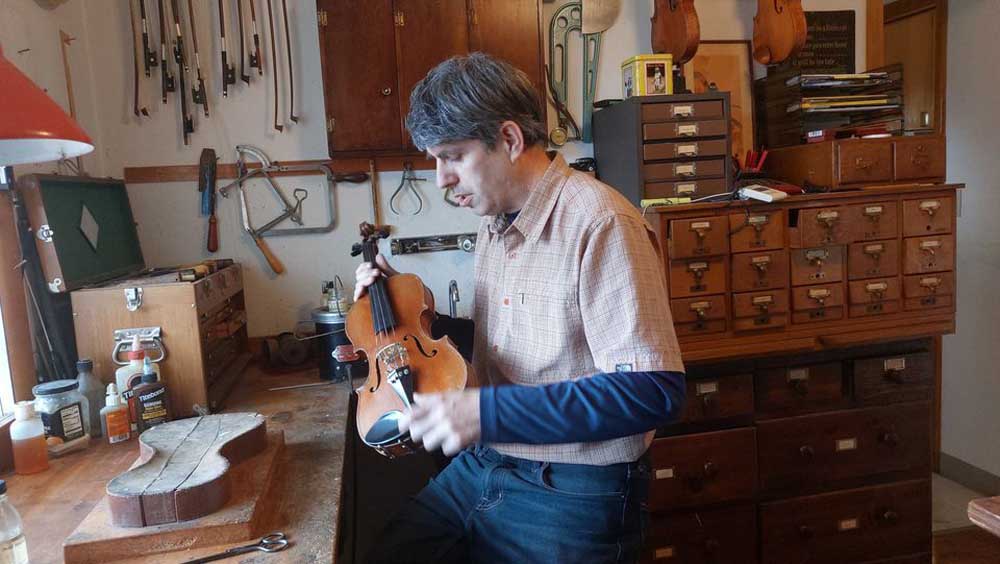A tiny violin shop in the Willamette Valley orchestrates a forceful musical legacy
Published 8:41 am Saturday, April 8, 2023

- Henry Strobel Jr. continues a family tradition at his small violin shop outside Aumsville. His father, Henry Strobel Sr., gained notoriety for recording standard measurements and procedures for making violins and cellos.
When Randall Gregory’s parents bought him a violin from the Henry Strobel Violin Shop in 1989, a life of music began.
His violin followed him through middle school, high school, college and 23 years teaching orchestra in Salem schools. He returned to the shop in Aumsville for adjustments and repairs.
Trending
Then one day, a few months ago, his violin fell on the floor.
When Gregory picked the broken bridge off the floor, he noticed the remains of the mark that Henry Strobel Sr. (who died in 2018) always left on the parts he made.
“I was never going to get another Henry Strobel Sr. bridge,” Gregory said. “That just added an extra tear. He took care of my violin so I could use it to teach others.”
Henry Strobel Jr. keeps his late father’s shop and legacy alive. “He fixes instruments that really should have been recycled and repairs them so they can stay in the service of children,” said Gregory, who has taught orchestra classes for elementary school students since 1999.
“We send countless kids out there to get their first violins,” he said. “You are transported into another world with all of these amazing, beautiful violins.”
As Strobel Jr. delicately fits new bridges to old violins, his hands are steady, but he feels the world his family knew slipping through his fingers.
Trending
People once drove from Salem and Portland to have instruments repaired or replaced at the shop.
Now customers, especially the young ones, buy their violins online and watch videos to attempt their own repairs.
“YouTube has kind of replaced me to some degree,” Strobel Jr. said.
Many of the violin makers on the videos likely learned the basics of their craft from Strobel’s father. The elder Strobel created nine illustrated manuals, starting with 1989′s “Useful Measurements for Violin Makers: A Reference for Shop Use.”
“Mr. Strobel’s books are certainly well-known and well-regarded,” said Tim Olsen, the founder of the Guild of American Luthiers (the professional term for makers of violins and other string instruments).
Before Henry Strobel Sr. published his books, measurements and techniques for making violins were passed from masters to apprentices. “If you were an insider to the violin trade, you would know,” Olsen said. “If you were not, you would not know.”
Strobel Sr.’s books changed that. “He earned respect for being a reliable source for accurate, complete information,” Olsen said.
Not all luthiers like the idea of sharing information, said Olsen. “I don’t think that he broke any taboos or stole any hidden knowledge, although the violin crowd has been a much more closed community than the guitar crowd for a long time.”
Nonetheless, Strobel Jr. said his father became a legend in the music community. People flocked to the shop on Mill Creek Road to meet him. “My dad signed a lot of autographs,” he said. “They even wanted my autograph.”
The Strobels are particularly beloved by people associated with the Salem Youth Symphony, said Joyce Epp, the symphony’s executive director from 2008 to 2018.
Strobel Sr. joined the symphony’s board of directors in 1999 and served until shortly before his death. Early in his tenure, he helped the symphony become an independent nonprofit after years of depending on Willamette University and other sponsors.
When the symphony marked its 50th anniversary in 2005, he wrote an extensive history of the organization. “He was a very important part of the organization and some of the changes it made,” Epp recalled.
Through it all, she said, he continued to provide children with string instruments.
“Providing students with affordable instruments was definitely a motivating factor for him,” Epp said. “The violin-making itself was important, but his motivation seemed to come from wanting to help the young people.”
Keeping the business going
Strobel Jr. tends the shop by himself these days.
He keeps the business going largely for the young people who need violins and cellos for their school orchestras, he said. “I don’t get fancy clients coming in with multi-thousand-dollar Stradivarius violins.”
The shop sells traditional violins, cellos and violas as well as the occasional double bass and guitar. Nothing is electric. Prices typically range from $200 to $2,000, Strobel Jr. said, because of the wide variety of instruments.
Student instruments generally sell at the lower end of that range.
Many violins that people purchase online are cheap and shoddy, he said. The challenge is to make them sing. “It’s rare that you find a violin that you can’t make sound good,” Strobel Jr. said.
The price of repairs can be as little as zero for repeat customers who need simple fixes. Or a customer may only pay $30 for a missing part. Overall, Strobel Jr., said he likes to keep repair bills under $300 unless a major renovation of an antique instrument is required.
If an inexpensive violin can be saved, however, Strobel Jr. said it can still make beautiful music.
“If you get a modern engineered plywood one, it actually sounds halfway decent and, of course, if you have a professional musician playing it, you’re not going to know the difference between the Stradivarius and this one — maybe a little bit,” he said.
“Anything you’re playing is going to get the job done, provided it’s set up properly,” he added.
Respect for his father
Strobel Jr. said he also keeps the shop, started in 1985, going out of respect for his father’s legacy. His father grew up in a poor family in Tell City, Indiana, and learned to play the violin in the local Catholic school. “He was taught by the nuns at school,” he said. “They had a rinky-dink violin that he could play.”
He later became an electronics engineer in the Air Force, retiring as captain, before applying the precision of his engineering training to making instruments — finishing his first violin in 1969. He never forgot the people who lived in poverty in Indiana, Strobel Jr. said. “He turned away almost nobody.”
The elder Strobel turned to publishing in the 1980s as he aged and was no longer able to perform the delicate work of making and repairing instruments.
In an interview in 1992, the elder Strobel reflected on his first book. “I really compiled ‘Useful Measurements for Violin Makers’ for use in my own shop so that I would know what I was doing, and it sold 5,000 copies,” he told interviewer Jonathan Peterson in the trade publication American Lutherie.
Strobel Jr. never played the violin himself. He majored in English and minored in art at Western Oregon University before returning to Aumsville to take on the family business in 2003.
“What happens is that you hear all these people playing violin music in the background, Dad is tuning up in the library constantly, then you accidentally develop an ear for what was supposed to be there,” he said.
These days, Strobel Jr. hears the unmistakable sound of a coda as the little rural shop that grew to a legendary crescendo plays its final measures. “It’s probably going to end with me,” he said.
The Henry Strobel Violin Shop: 10878 Mill Creek Road S.E., Aumsville; 503-749-1742. Henry Strobel Sr.’s books are available for purchase at www.henrystrobel.com.








